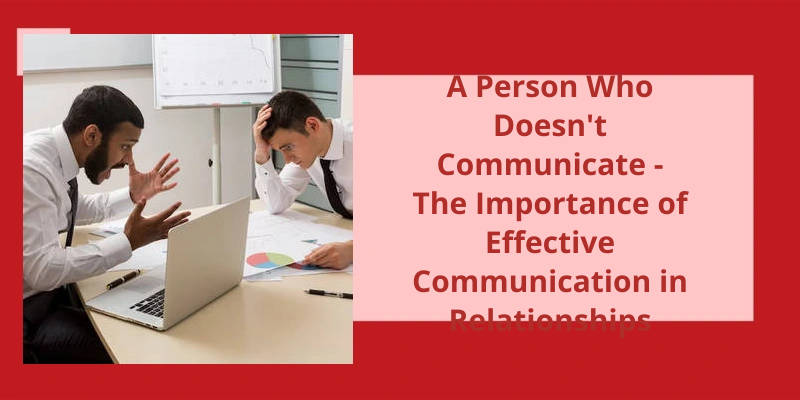However, there are instances where one might encounter a person who doesn't communicate openly, hindering the growth and development of the relationship. Such individuals often struggle to express their thoughts, emotions, or needs, causing frustration, misunderstanding, and a sense of disconnect for both parties involved. Understanding the importance of effective communication becomes essential in these scenarios, as it allows us to delve into the complexities of this issue and explore ways to bridge the communication gap, nurture relationships, and create a space where honest expression can flourish. Through exploring the underlying reasons behind a person's struggles with communication and implementing strategies to improve understanding, we can strive towards building healthier, more fulfilling connections with those who may find verbal expression challenging.
What Does It Mean When Someone Lacks Communication?
A person who lacks communication skills may struggle to express their thoughts, emotions, and needs clearly and effectively. They may find it difficult to articulate their viewpoints or engage in productive conversations. This can hinder their ability to establish and maintain strong relationships. When there’s a lack of communication, misunderstandings and conflicts may arise, leading to frustration and resentment.
Effective communication is crucial for establishing trust and building healthy connections. It ensures that both parties feel heard, understood, and valued. When communication is lacking, individuals may feel isolated, unheard, or invalidated, leading to strain and distance in their relationships. Moreover, a person who struggles with communication may find it challenging to resolve conflicts or navigate difficult conversations, leading to unresolved issues and an accumulation of resentment over time.
To address a lack of communication, individuals can invest time and effort in learning and developing their communication skills. This may involve actively listening to others, practicing effective speaking and articulation, and seeking feedback from trusted individuals. It may also involve recognizing and addressing any underlying fears or barriers that may contribute to the difficulty in communicating. By investing in communication skills, individuals can enhance their relationships and foster more meaningful connections in both personal and professional spheres.
Strategies for Improving Communication Skills
- Active listening
- Effective body language
- Clear and concise messages
- Empathy and understanding
- Respectful and non-judgmental attitude
- Using appropriate non-verbal cues
- Being open to feedback
- Building rapport and trust
- Asking clarifying questions
- Being mindful and present in conversations
Other times, individuals may use the silent treatment as a way to manipulate or punish others. Regardless of the intention behind it, refusing to communicate can have a negative impact on relationships and emotional well-being. It’s important to understand the possible reasons and consequences of this behavior in order to address it effectively.
What Does It Mean When Someone Refuses to Communicate?
This could be due to a fear of confrontation or a lack of assertiveness skills. Others may refuse to communicate as a means of asserting power and control over the other person. This form of emotional abuse can be damaging to relationships, as it creates a barrier to effective communication and can lead to feelings of frustration, resentment, and even isolation.
When someone refuses to communicate, it can also be a sign of underlying issues within the relationship or within themselves. It may indicate a lack of trust, unresolved conflicts, or deep-seated emotional pain that they’re unable or unwilling to address. In some cases, individuals may have difficulty expressing their thoughts and emotions due to past traumas or unhealed wounds.
Effective communication is the lifeline of any healthy relationship. It builds trust, fosters connection, and allows for the open expression of thoughts, feelings, and needs.
In order to address this issue, it’s important for both parties to recognize the importance of effective communication and the impact that refusing to communicate can have on their relationship. It may be helpful to seek professional help from a therapist or relationship counselor who can provide guidance and support in developing healthy communication patterns.
It’s crucial for individuals to recognize and address the underlying issues that may be causing this behavior, and to work towards open and honest communication for the overall health and well-being of the relationship.
Understanding the Different Reasons Why Someone Might Refuse to Communicate
Understanding the different reasons why someone might refuse to communicate is essential when it comes to fostering healthy and effective relationships. There can be various factors contributing to a person’s avoidance of communication, such as fear, past trauma, insecurity, or a lack of trust. It’s important to approach the situation with empathy and patience, creating a safe and non-judgmental environment to encourage open dialogue. By understanding and addressing these underlying reasons, individuals can work towards building better communication skills and establishing stronger connections in their relationships.
They may fail to express their thoughts clearly, leading to misunderstandings and confusion. Poor communicators may also avoid addressing conflicts or delivering feedback, which can hinder effective problem-solving and personal development. Overall, their lack of responsiveness and inability to engage effectively can impede productivity and hinder collaboration within team environments.
What Does Poor Communication Look Like?
They may not listen attentively or offer thoughtful responses, leaving you feeling unheard and undervalued. Poor communicators often struggle to convey their thoughts and ideas clearly, leading to misunderstandings and confusion. They may use vague or ambiguous language, making it difficult to understand their intentions or expectations. In addition, they may avoid discussing important topics or shy away from expressing their emotions.
Lack of responsiveness is another common characteristic of poor communication. They may fail to reply to emails, text messages, or phone calls promptly, causing frustration and resentment. When confronted with a problem or conflict, they may avoid addressing it altogether or procrastinate in finding a resolution. This constant lack of engagement can damage relationships and lead to a breakdown in trust.
Poor communicators may also exhibit disinterest or disengagement during conversations or meetings. They may appear distracted, constantly checking their phones or looking away, giving off the impression that they aren’t fully present or invested in the conversation. This behavior can make you feel dismissed or unimportant. Additionally, they may struggle to articulate their thoughts and ideas, often stumbling over their words or providing incomplete information, leading to confusion and frustration.
Furthermore, poor communicators may often become overwhelmed or overloaded during discussions or decision-making processes. They may struggle to process information, become indecisive, or avoid making choices altogether. This can create frustration and impede progress, making it difficult to reach agreements or make informed decisions.
These behaviors can hinder effective communication in relationships, leading to misunderstandings, resentment, and a breakdown in trust. It’s essential to recognize and address poor communication patterns to foster healthy, open, and meaningful connections in both personal and professional settings.
Poor communication skills can manifest in various ways, such as passive listening, shutting down, bottling up emotions, outbursts of anger or sadness, yelling or screaming, abusive behavior, and dismissing the opinions of others.
What Communication Skills Do I Lack?
Communication skills are essential in building and maintaining healthy relationships, yet many individuals struggle with certain aspects of effective communication. One common sign of poor communication is passive listening, where a person simply nods or pretends to listen without truly engaging or understanding the other person. This lack of active listening not only hinders the flow of conversation but also prevents meaningful connections from being formed.
Another indicator of poor communication is shutting down, which often occurs when a person becomes overwhelmed or emotionally triggered during a conversation. Instead of expressing their thoughts and feelings, they withdraw from the interaction altogether, resulting in unresolved conflicts and unresolved issues. This pattern of shutting down can create distance and strain in relationships, making it difficult for both parties to feel heard and understood.
Bottling up emotions until they explode in anger or sadness is another common communication pitfall. Those who struggle with this may find it challenging to express their needs, concerns, or frustrations in a healthy and timely manner. Consequently, their emotions build up over time, leading to explosive outbursts or bouts of sadness that may catch others off guard and damage the relationship.
Engaging in yelling or screaming during conversations is an obvious sign of poor communication. It’s an ineffective way of expressing oneself and often escalates conflicts rather than resolving them. Additionally, becoming physically or verbally abusive during communication is a severe indicator of poor communication skills. Respecting boundaries and treating others with kindness are fundamental elements of effective communication, and any form of abuse undermines those principles.
Lastly, dismissing other peoples points of view is a telling sign of poor communication. This involves invalidating or belittling the thoughts and opinions of others instead of genuinely considering their perspective. It creates an atmosphere of defensiveness and hostility, impeding any productive exchange of ideas or compromise. Effective communication involves active listening, empathy, and a willingness to understand and respect different viewpoints.
Overall, recognizing the signs of poor communication can help individuals identify areas for growth and improvement.
Communication problems can arise from various factors, such as a lack of knowledge or information about the subject matter being discussed. Additionally, cultural differences can hinder effective communication if not understood and respected. Furthermore, a lack of motivation to communicate or not utilizing appropriate communication tools can contribute to communication breakdowns. Lastly, attitude plays a significant role in effective communication, as negative attitudes or biases can impede understanding and collaboration. By addressing these causes, individuals and organizations can work towards enhancing effective communication and fostering better relationships.
What Causes Communication Problems?
Communication problems can arise from various factors, and lack of knowledge or information is one of them. When individuals aren’t well-informed or lack understanding about a specific subject matter, it becomes challenging for them to effectively communicate their thoughts or ideas. This can lead to misunderstandings, misinterpretations, and ultimately, breakdowns in communication.
Cultural differences also contribute to communication problems. People from different backgrounds may have varying communication styles, norms, and practices. Interacting with individuals who’ve different cultural perspectives requires open-mindedness, flexibility, and adaptability. Without this awareness, miscommunication and confusion may arise, hindering effective communication.
Furthermore, lack of motivation can be a significant barrier to effective communication. When individuals don’t have the desire or drive to actively engage in communication, they may not put in the effort to convey their thoughts clearly or actively listen to others. This can result in disengagement, lack of attention, and incomplete communication, all of which contribute to ineffective communication.
Another cause of communication problems is the inappropriate use of communication tools. With the advancement of technology, we’ve an abundance of communication tools at our disposal. However, if individuals aren’t familiar with the appropriate use of these tools, such as email etiquette or video conferencing protocols, misunderstandings and miscommunication can occur. It’s crucial to understand the nuances of different communication platforms to ensure effective and efficient communication.
Finally, attitude plays a significant role in communication problems. Ineffective communication can stem from negative attitudes, such as arrogance, defensiveness, or dismissiveness. These attitudes hinder open and honest communication, as they create barriers and resistance between individuals. It’s essential to foster positive attitudes, such as empathy, respect, and active listening, to create a conducive environment for effective communication.
Various factors can contribute to communication problems in relationships. By being aware of these factors and actively working to address them, individuals can improve their communication skills and foster stronger relationships. Effective communication is vital for understanding, empathy, and building meaningful connections with others.
Conclusion
In conclusion, a person who doesn't communicate poses significant challenges to the dynamics of any relationship. Without open and honest dialogue, misunderstandings and resentment can fester, ultimately leading to the deterioration of the relationship. By doing so, they can cultivate a healthier and more fulfilling relationship, characterized by mutual respect, empathy, and genuine connection.






